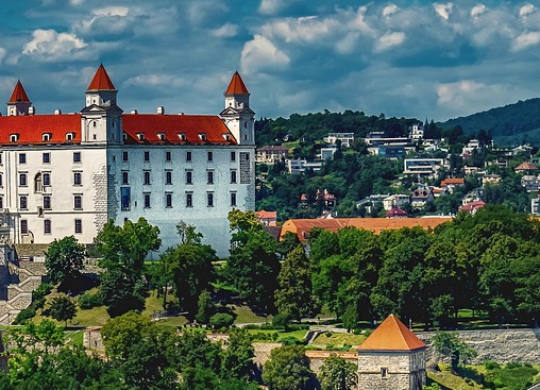
Slovakia is a country in the center of the European continent, with a compact population of 5.5 million inhabitants. The official language here is Slovak, and the currency is the euro. The average salary in this country is 1177 euros.
Work in Slovakia
Slovakia is a country with a developing economy, in which the field of tourism is leading. Almost 70% of residents work in this service sector. The main industries are the production of electronics and vehicles, as well as agriculture. It is a large part of the economy, 40% of the land is dedicated to this activity.
The gross salary in Slovakia, depending on the type of work, is between 780 and 2,100 euros per month, and working hours are 8 hours per day, 40 hours per week. Health insurance is available to everyone, residents, and foreigners.
Slovakia also has a high level of unemployment, and salaries cannot compete with those in other countries of the Old Continent. At the same time, if you have come here to work, remember: without the Slovak language, there is no way, just like without a work permit. Therefore, today mostly unique specialists go to work in this country, whom local employers are very happy to see. Or representatives of low-paid professions, because here they can get good money for their work.
What is interesting: according to Slovakian legislation, a local employer must first choose his compatriots for work and only if he does not find such, employ foreigners. Few such employers will produce all the necessary papers. But the foreigners who have a good chance of finding a job here are doctors and medics. Programmers, engineers, builders, and locksmiths can also look at vacancies.
At the same time, keep in mind: the deadline for issuing a work permit in this country is one month with the participation of the employment center. After receiving it, you will have the right to work in Slovakia for two years.
By the way, you can take out insurance on our website.
Employee rights
Employees in Slovakia have the right to:
• minimum salary - 646 euros gross;
• holidays lasting 20 days a year;
• allowances for work at night - 1.43 EUR/hour, on Saturdays - 1.79 EUR/hour. or Sunday 3.58 euros/hour;
• allowance for food, if working more than 4 hours during the day;
• 30-minute rest if the work shift lasts more than 6 hours;
• Medical Insurance;
• Social Insurance.
Salaries of doctors
Interestingly, doctors here are paid an average of 1.5 thousand euros per month without bonuses, nurses - 900 euros per month, and orderlies - 500 and more euros. At the same time, doctors in Slovakia can enjoy benefits.
Employment
First, you need to prepare all the necessary documents to get a work visa to Slovakia for three months. When you arrive in the country, you submit documents for a temporary residence ID card for 2 years to the migration police, and after receiving it, you can go to work. Do not forget, being a candidate for a certain job, to take scanned copies of passport pages with all marks, a resume with a photo, and a certificate of a criminal record.
At the time of employment, the employer must familiarize you with the terms and conditions of employment, the collective agreement (if applicable), the laws relating to the work you are required to perform, and occupational health and safety legislation. When hiring, the employer is obliged to register you as an employee with the Social Insurance Agency, the health insurance company, and the tax inspectorate.
Most employment contracts in Slovakia are open-ended. Temporary work can be agreed upon for a maximum of two years.
Employment in Slovakia is established by a written employment contract between the employer and the employee.
In general, Slovaks are very open to foreigners, they take it as a compliment that you want to visit their country.
Taxes in Slovakia
Once you are in Slovakia and have decided in which city you intend to live, it is important to register with the relevant tax authority (Daňový úrad Bratislava) for income tax purposes within 30 days. You are then ready to start contributing and your salary is registered to pay at the end of the financial year between 19% and 25% depending on your income.





